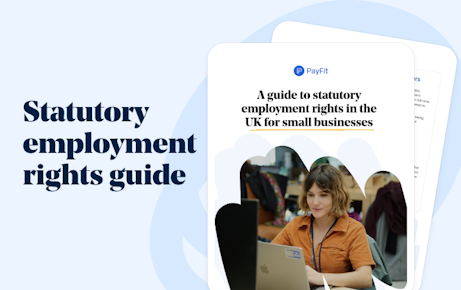Bank Holidays and Employment Law: Your Complete UK Guide for 2025


The UK has a lot of love for bank holidays. But from a payroll perspective, they can be tricky to deal with. There’s also plenty of questions to consider as an employer. What if an additional bank holiday is granted - for example to celebrate the recent King’s coronation? Should employees receive extra pay for working on bank holidays? Can an employee legally refuse to work on a bank holiday? And what’s the deal with employment law, bank holidays and part time workers?
In this guide, we break down everything to do with bank holiday employment law and answer some of the questions that HR teams and business leaders will be posing themselves around employment law and bank holidays.
What’s the difference between a public holiday and a bank holiday?
A bank holiday is a national public holiday that’s observed across the UK. The name ‘bank’ comes from the fact that banks have traditionally always closed on these days, along with many other businesses.
Public holidays, on the other hand, mark traditional cultural events such as Christmas or Easter Monday.
In the eyes of UK employment law, bank holidays and public holidays are essentially the same thing. That’s because there’s no real material difference between these two terms - businesses are closed in either scenario. So, for the purposes of this post, ‘bank holidays’ refers to both bank and public holidays (and any guidance applies to both).
How many bank holiday days can employees be entitled to?
The Working Time Regulations Act of 1998 stipulates that employees are entitled to 5.6 weeks of paid annual leave (pro-rata if they’re part-time). That’s around 28 days a year.
Holiday entitlement is a whole subject unto itself; in this post, we’ll focus exclusively on how bank holidays factor into this. And the answer to this is that when it comes to including bank holidays as part of holiday entitlement, employers have a few options.
One of these is to include bank holidays with the statutory entitlement, so as part of their 28 days, employees would also get bank holidays off. Alternatively, you could give your employees bank holidays off on top of the statutory entitlement. So, for instance, you could give them 36 days of holiday in total (28 days + 8 additional days for the bank holiday).
It’s worth noting that bank holidays do differ between England, Scotland, Wales and Northern Ireland, so if you have staff based in these areas, you should ensure their contracts reflect this.
Can you require your employees to work on bank holidays?
When it comes to employment law regarding bank holidays, there is no legal requirement for workers to take time off work on a bank holiday. Whether they can take the day off or not depends on their work contract.
This is something that surprises a lot of workers and employers alike - after all, isn’t the whole point of a bank holiday to have time off to make the most of that famous UK long weekend culture (or simply sit at home and eat a whole plate of mince pies)? However, this isn’t the case - employers are, in fact, free to set their own rules when it comes to bank holiday working.
Given this, some businesses might choose to continue operating on a bank holiday, which can be very useful for, say, retailers at Christmas.
It all comes down to what’s worded in your employee contracts as well as your annual leave policy.

Employee contracts and bank holidays
One thing is clear: The rules regarding how you deal with bank holidays as a business should be clearly stated in your annual leave policy as well as your employee contracts. These documents should clarify the following:
whether staff get paid time off for any bank holidays;
if minimum holiday entitlement includes or excludes bank holidays;
if staff can work on a bank holiday in return for a different day (this is known as an alternate day or day in lieu);
whether enhanced pay is given to staff members working on bank holidays.
Days in lieu
If an employee does work on a bank holiday, and their contracts stipulate they need to take a ‘day in lieu’, you’ll need to encourage them to take a day off at another time. This is because every worker is entitled to a minimum of 5.6 weeks of annual leave entitlement (pro-rated if they’re part-time). And no, paying double time for a bank holiday worked does not take the place of this day off in lieu.
What about part-time staff? Are they entitled to bank holidays?
In short, yes. When it comes to employment law, bank holidays and part time workers, staff shouldn’t be treated less favourably than full-time colleagues. As long as they work regular part-time hours, you’ll need to provide them with pro-rata bank holidays based on the full-time entitlement.
In the case of part-time workers with irregular hours (on an ongoing contract basis), these workers are entitled to the full 5.6 weeks of annual leave, not a prorated amount, as was deemed by the Supreme Court in Harpur Trust vs. Brazel.
Calculating entitlement for part-time workers
The pro-rata calculation for part-time workers remains crucial in 2025. Here's the updated approach:
Calculate the proportion of full-time hours worked
Apply this proportion to the full-time bank holiday entitlement
Account for any bank holidays that naturally fall on their working days
Consider any premium payments for bank holiday working in line with current rates
What happens if a new bank holiday is granted?
It’s rare, but it can happen. Usually, employees rejoice at the occasion of getting an extra bank holiday in the working year, though sometimes these are added to mark a more sombre occasion (such as the death of a monarch).
In fact, in 2022, we saw two additional bank holidays added for:
the Platinum Jubilee
the funeral of Her Majesty Queen Elizabeth II
And, in 2023, we received yet another additional bank to mark the coronation of King Charles III.
So, what does employment law regarding bank holidays say in these situations, and how should you factor them into employee entitlement? The answer is always to go back and look at their employment contracts. These, above anything else, should dictate how you treat any bank holiday. Find out more in this useful Help Centre article.
Changes to bank holiday entitlement in 2025
The landscape of bank holiday entitlement continues to evolve with the continued rise of flexible working arrangements. In 2025, employers need to be particularly mindful of:
The introduction of more flexible working patterns and their impact on bank holiday calculations
Changes to holiday pay calculations for irregular hours workers
New guidelines for managing bank holidays within compressed working weeks.
How do flexible working arrangements affect bank holidays?
With the expansion of flexible working rights in 2025, employers must ensure fair treatment regarding bank holidays for employees with different working patterns:
Compressed hours workers should receive equivalent bank holiday entitlement to traditional workers
Hybrid workers may have different arrangements depending on whether bank holidays fall on their office or remote working days
Employers should clearly document how bank holidays are handled in flexible working agreements.
Payroll software you can bank on
With PayFit, bank holidays employment law is one less thing you’ll need to concern yourself with.
Never worry about mistreating bank holidays through payroll ever again, with payroll software that’s coded to automatically include a new bank holiday whenever it arises, so you can sit back and relax. Plus, our best-in-class payroll technology means you can automate up to 90% of your payroll tasks.
And better still? PayFit works in harmony with leading HR platforms, so you can sync bank holidays with your payroll for instant updates - perfect for part-time and casual workers.
Find out why over 10,000 businesses trust PayFit on a monthly basis to run their payroll.
Bank holidays & employment law FAQs
Hybrid working arrangements don't affect the basic bank holiday entitlement, but employers should clearly specify how bank holidays are handled when they fall on designated home or office working days. The key is maintaining consistency and fairness in your approach.
Yes, employers can require staff to work on bank holidays if it's specified in their employment contract. However, appropriate compensation must be provided, either through alternative time off or additional payment as per the contract.
Employees working compressed hours (full-time hours over fewer days) should receive the same bank holiday entitlement as traditional workers. This might mean additional leave if bank holidays regularly fall on their non-working days.
Recent updates to holiday pay calculations affect workers with irregular hours. From 2024, employers have new guidance on calculating holiday entitlement using the 52-week reference period system.







